#judge mainwaring
Explore tagged Tumblr posts
Text

The classy and dreamy evil trio come back.
I think the three of them are shooting the cover of a fashion poster.
Ah yes, Professor Karl's movements are really coquettish, but don't ask me why Prince Saliano's clothes are so ...fancy.
I just want to practice my coloring, and it's also fun to draw Lugosi and Lorre and Karoff together. I may not get tired of painting 10 thousand times, because I like their role setting in You'll Find Out so much.😭😭😭😭
What a perfect evil combination of prince, professor and judge ...
By the way, I wish you a happy new year! Congratulations on getting rich ~Continue to love Peter Lorre in the new year.
#peter lorre#bela lugosi#boris karloff#you'll find out (1940)#karl fenninger#prince saliano#judge mainwaring#fanart#my art#myPLart
51 notes
·
View notes
Text
I appreciate that filmmakers repeatedly find ways to attach Peter Lorre's characters very closely to characters that are noticably taller and/or ganglier than he is. Whether they have romantic tension or just seem like they're great friends/colleagues, there's a sort of bonded pair [or trio] vibe they give off that I live for.







#there are more than this i'm sure but these are the ones i remembered#mrs. bennett takes exception to the bonded pair rule but she gets honorable mention cuz she was a powerhouse#shit now i gotta tag everyone#herman einstein#jonathan brewster#arsenic and old lace#the nesting doll polycule#karl fenninger#prince saliano#judge mainwaring#you'll find out (1940)#lucky#mr. marko#black angel (1946)#nurse agnes#abbott#the man who knew too much (1934)#willie#kismet#my favorite brunette#catherine bennett#felix gillie#waldo trumbull#comedy of terrors#peter lorre#phew#jonathan is truly gigantic holy cow
51 notes
·
View notes
Note
I fucking love this. I fucking love everything you wrote. I fucking love this series.And I have to watch The Boogie Man Will Get You because of this article.
This is so much fun! Ah, I like it when Gogol and Professor Karl are talked about looks alike....Although they have the biggest difference in body shape. Gogol is stout, while Professor Karl is ... petite.
Besides, I like Professor Karl's background story so much!Ha, he is definitely the kind of bad student who will copy other people's answers to be lazy.And Herman is the poor guy who was copied!But I feel that if Professor Karl studies harder, maybe he can solve everything by himself soon.
Maybe a silly question, but do you have any specific headcanons for how the medical malpractice gang are related or came to know eachother?
Not a silly question at all! And sorry I only just now got to answering you!
I've toyed with different headcanons with these four idiots. One of my favourites is that they're related but they have no idea that they are. To me that's the funniest one! As to how they met...
Gogol and Fenninger definitely met in Paris. Fenninger trying to run whatever criminal enterprise he has on his mind together with his accomplices/cronies/friends/lovers and Gogol, because, well, he lives there. I imagine they came across each other in a café and first pointedly ignored each other until doctor Wong or Prince Saliano loudly started commenting on their appearances and how they look like each other.
Arthur and Herman definitely met each other in the good ol' US of A, with Herman and Jonathan on the run and ending up in that podunk village run by Arthur. Hell, they might even be staying over at Nathaniel's old inn with Nathaniel trying to recruit the two for one of his experiments, Jonathan plotting to kill the old professor, Herman trying to stop Jonathan, and Arthur barging in with a 'what's all this, then?' Also I imagine Jonathan trying many attempts on Arthur's life simply because he's a sheriff. Also Arthur is completely clueless to Jonathan's criminal status.
Fenninger met Herman in Heisenberg, Germany because they went to the same medical school and Fenninger dropped out to live a life of crime, and because I think that would be funny. I just like the idea of Fenninger being sent there as a young lad by his rich parents to make something of himself (and because he refused to join the military like any good Viennese of higher standing should) and meeting Herman as a nervous student doing his goddamn best to make it through.
As to how they all met the others? Fenninger and his gang are on the run after the whole Kay Kyser incident and decide to lay low in the countryside, coincidentally where Arthur and Nathaniel live. There they come across Jonathan and Herman who recognises Fenninger as that cool rich kid who was always copying his answers in class. And Gogol...? He was at a conference in New York when his taxi got hijacked by this gang of idiots (Herman, Jonathan, Fenninger, Saliano, Mainwaring) on the run and gets recognised by Fenninger!
By that point I simply imagine them just constantly bumping into each other in the most unlikely places and in the end just resigning themselves that they are somehow cursed by fate to constantly see each other and making the best of it.
#medical malpractice#dr gogol#dr arthur lorentz#professor nathaniel billings#professor karl fenninger#prince saliano#judge mainwaring#herman einstein#jonathan brewster#youll find out#mad love#arsenic and old lace#the boogie man will get you#peter lorre#peter lorre speculation
13 notes
·
View notes
Text
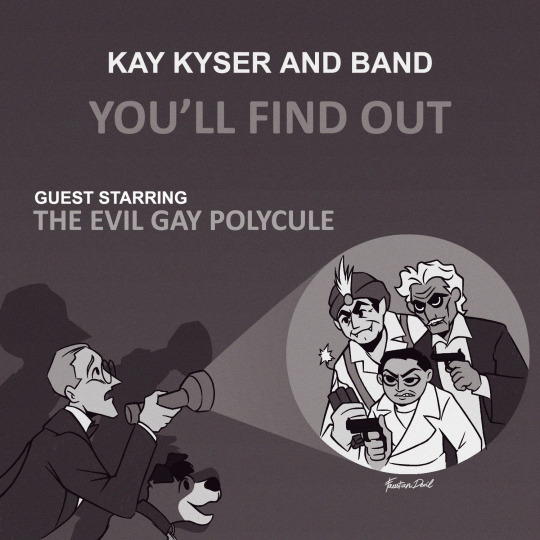
Happy ‘ween!! I am a day late, because I had to work yesterday and only now I could finish this.
When I showed You’ll Find Out to my friends I kept describing it as what if Scooby Doo was a big band instead of a group of teens. I mean that’s basically the movie. You got a spooky mystery, there’s a dog, and a couple a villains. It’s an early Scooby movie.
#Bela Lugosi#Béla Lugosi#Boris Karloff#Peter Lorre#Kay Kyser#You'll Find Out#You'll Find Out (1940)#Scooby Doo#Prince Saliano#Judge Spencer Mainwaring#Spencer Mainwaring#Professor Karl Fenninger#Karl Fenninger#Faustian Fables#Faustian Imagery#Oh yeah also dog with the bangs#And the boots with the fur#The whole club was looking at her?#I hope I got the style to be recognizable#I gave up with the lettering tho
49 notes
·
View notes
Text
Yknow what I always found super weird about the ending of You'll find out?
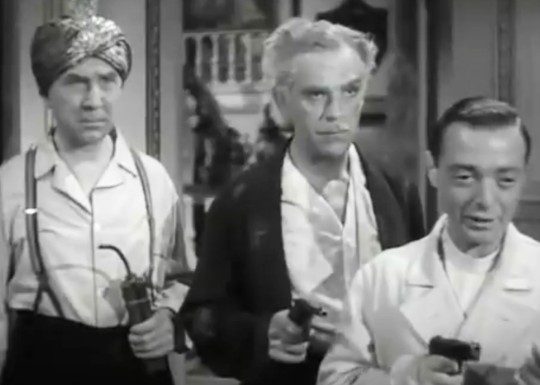
Why is Saliano the only one wearing what seems to be just normal clothes when everyone else is wearing Pajamas?
It would be one thing if it was the outfit he was wearing earlier in the film, but its not. He was wearing a tux and then his sorcerer robe. Why did he change into a normal shirt, slacks and suspenders and why didn't Fenninger and Mainwaring aswell???
#these are the questions that keep me up at night Larrys and germs#youll find out#professor karl fenninger#judge Spencer mainwaring#prince saliano#i thought that maybe salianos is wearing pajamas? but surely pajamas with suspenders were never a thing right?#i imagine theyd just be super uncomfortable and awkward to deal with
5 notes
·
View notes
Text


Thanks to the TARDIS wiki, we have hi-res scans of Clive's Doctor photos from Robert Hack's illustrated edition of RTD's novelisation of "Rose." We can see that there are more incarnations illustrated than there included in the text. As well as the first thirteen (numbered) Doctors, the wiki lists the Fourteenth and Fugitive Doctors, but I can't see them there (there's the hair of one who could be either Ten or Fourteen, but it's not clear).
Clearly visible, though, are the Fifteenth Doctor, and the two Doctors RTD invented for the novelisation - a black woman with a flaming sword and a child in a wheelchair with K9. At the time the book originally came out it was generally assumed these were future incarnations, but they could be past lives before the First Doctor.
Most excitingly, though, are the two Morbius Doctors included. On the first selection, there's a sideways-sitting picture of the George Gallaccio Doctor (aka Doctor Crocus) and an upside-down picture of the Douglas Camfield Doctor.
I'm also intrigued by the picture beneath the snaps of the Third Doctor and the Whomobile and the Eighth Doctor. It's probably supposed to be the Third Doctor and the Brigadier, judging by the filly cuffs and 'tache respectively. It doesn't really look like either of them, though. (The soldier looks more like Captain Mainwaring from "Dad's Army!")
#doctor who#doctor who novelisations#doctor who: rose#every version of the doctor#morbius doctors#forgotten lives
22 notes
·
View notes
Photo
beautyandterrordance:
Peter Lorre, Bela Lugosi & Boris Karloff, in You’ll Find Out (1940).

#damn bro that was so funny#no really. sorry. we didnt mean for that to sound so sarcastic#we're just kinda tired#youll find out#professor karl fenninger#judge spencer mainwaring#prince saliano
71 notes
·
View notes
Text
Lady Susan Readthrough: Letter 41 and Conclusion
Summary: Catherine cannot bring Frederica to visit as Lady Susan had come and taken her to London. Catherine did what she could to prevent it and assured Frederica that she could write in distress. A+ on Aunting. Lady Susan did not reveal what happened with Reginald while at Churchill.
Suspecting that Lady Susan is monitoring their correspondence, Catherine determines to visit Frederica in town and try to bring her back to Churchill. Lady Susan asks if Frederica is looking well and suggests town may not be good for her daughter's health. Catherine urges her over several days to let them take her daughter back to the country and succeeds at last.
It is clear afterwards that Lady Susan wanted Frederica gone, as she marries Sir James herself three days later! Catherine maintains tacit custody of Frederica until she marries Reginald.
-+-
Catherine is a bit wary that Reginald has actually left Lady Susan for good:
Pray heaven, Reginald may not be in town again by that time!
Catherine's husband continues to not be very bright:
Her manner, to be sure, was very kind and proper, and Mr. Vernon believes that Frederica will now be treated with affection. I wish I could think so too.
To say that the end of the letters was a blow to the finances of the government is hilarious!
Mr. Vernon, who, as it must already have appeared, lived only to do whatever he was desired
I think this means Mr. Vernon is a malewife? Catherine really does seem to direct this relationship and hold most of the brains.
was met with such an easy and cheerful affection, as made her almost turn from her with horror. No remembrance of Reginald, no consciousness of guilt, gave one look of embarrassment; she was in excellent spirits, and seemed eager to show at once by every possible attention to her brother and sister her sense of their kindness, and her pleasure in their society.
Lady Susan has no remorse, maybe only regret, but she is able to show whatever emotion she pleases. Catherine is totally disgusted by her.
The first hope of anything better was derived from Lady Susan’s asking her whether she thought Frederica looked quite as well as she had done at Churchhill, as she must confess herself to have sometimes an anxious doubt of London’s perfectly agreeing with her.
For whatever reason, Lady Susan wants to be rid of her daughter, so she opens the door to Catherine taking her to Churchill, but of course she makes Catherine work for it!
Lady Susan’s maternal fears were then too much awakened for her to think of anything but Frederica’s removal from the risk of infection; above all disorders in the world she most dreaded the influenza for her daughter’s constitution!
LOL! I doubt it!
Lady Susan was managing three men, Reginald, Mainwaring, and Sir James. She loses Reginald, Mainwaring is unavailable, and she settles for Sir James. Without Alicia paying her way, it's unclear how Lady Susan is supposed to live, so I guess it's not surprising. By the end of the book, she is unwelcome everywhere.
Frederica was therefore fixed in the family of her uncle and aunt till such time as Reginald De Courcy could be talked, flattered, and finessed into an affection for her which, allowing leisure for the conquest of his attachment to her mother, for his abjuring all future attachments, and detesting the sex, might be reasonably looked for in the course of a twelvemonth.
Still so strange that they set Reginald up with the daughter of the woman he was engaged to! Then again, with how Lady Susan is I guess Frederica probably knew she would end up with her mother's sloppy seconds.
Whether Lady Susan was or was not happy in her second choice, I do not see how it can ever be ascertained; for who would take her assurance of it on either side of the question? The world must judge from probabilities; she had nothing against her but her husband, and her conscience.
You can only imagine that when Sir James has a freak horseback riding accident, she'll be back and the whole affair will start again?
Sir James may seem to have drawn a harder lot than mere folly merited; I leave him, therefore, to all the pity that anybody can give him.
This is VERY similar to Austen's final word on Rushworth:
She had despised him, and loved another; and he had been very much aware that it was so. The indignities of stupidity, and the disappointments of selfish passion, can excite little pity. His punishment followed his conduct, as did a deeper punishment the deeper guilt of his wife.
But this is a wonderfully hilarious note to end on:
For myself, I confess that I can pity only Miss Mainwaring; who, coming to town, and putting herself to an expense in clothes which impoverished her for two years, on purpose to secure him, was defrauded of her due by a woman ten years older than herself.
I kind of wish we ended with letters, but maybe Austen just wanted to wrap up at this point. She does often have very rapid wrap-ups after the two main characters get engaged.
Here is the masterpost.
Anyway, I love this little novella and I hope you enjoyed reading along with me!
There will be character analysis next.
#lady susan readthrough#lady susan vernon#lady susan#frederica vernon#reginald de courcy#I might do some character analysis now
11 notes
·
View notes
Text
ranger's apprentice characters as (dumb) shit i've done in my life
halt: brining up the existence of ireland to a person who didn't know what ireland was almost everytime i see them
crowley: being a loyal eurovision watcher
horace: putting my finger in a blender
will: shoot at two guys who were making fun of me and my friend for fucking around with our shitty bow at a play ground
cassandra: push a guy so hard he fell to the ground and started crying after he insulted me during musical rehearsal infront of atleast 15 people
alyss: bullshit my way through a debate and then get the highest grade of the class
gilan: ask someone i liked to dance and proceed to get rejected because i was 'too tall'
george: writing letters to a friend every few weeks for a year when i moved away and never getting a reply
#i was really young in some of these don't judge me#rangers apprentice#ranger's apprentice#will treaty#horace altman#halt o'carrick#princess cassandra#alyss mainwaring#gilan davidson#crowley meratyn#george carter
93 notes
·
View notes
Text



[Image ID: a strip of crossstitch fabric with two embroidery designs on it: a green oakleaf with the word “ranger” stitched over it in an uneven script and a small sunflower. The other pictures are closeups of the two designs. End Image ID.]
some stress sewing to keep me from getting distracted over finals week. I started the oak leaf a while ago and decided to finish it which is why it looks kind of lopsided. It’s my first time trying embroidery but I could tell I improved a lot just between the two designs so I’ll keep practicing this summer (and maybe try to turn these into patches?)
the oakleaf is inspired by the necklaces the characters wear in the Rangers Apprentice series. I headcanon that Alyss learned how to embroider from Pauline along with the diplomacy education (since historically, a lot of discussion happened around a sewing circle between women as they worked together and so it would be important to know). And she knew how important the identity of their jobs were to her friends because choosing day defined their entire lives, so she made little patches like this for all of them as graduation gifts when they finished their apprenticeships. I want to do the rest of them at some point. Jenny would put hers (a ladle) on the pocket of her apron. She made a matching oakleaf for Horace’s battle frock after the adventures in Gallica. George got a quill, and he put it on the flap of his satchel, so he can see it every time he goes to take out notebooks. The sunflower is just because I think sunflowers are pretty.
I also want to embroider the flag that Eilonwy makes for Taran in The High King - Henwen on a blue background (with the wrong colored eyes). Idk I just think the idea of fantasy girls both swinging swords and making pretty decorations for their SOs is a Neat idea
#embroidery#textile arts#rangers apprentice#The Chronicles of Prydain#Will treaty#alyss mainwaring#Horace Altman#eilonwy#Taran#I'm a beginner don't judge meeee#sunflower#oakleaf#nature#finals week
62 notes
·
View notes
Photo
(via fyeahpeterlorre, jamiskoli)

#i should write about their previous and future escapedes#i think fenninger and mainwaring met when they both happened to be hired as serving staff in a mansion while having unrelated plots to kill#their employers and/or steal their shit#wish it came to me sooner cause it wouldve made for a good entry to the 'Peter characters in drag' posts#although id be sad to lose the baby lugosi from the entry i did add for this film#anyway they look dope in this image as usual#youll find out#professor karl fenninger#judge spencer mainwaring#prince saliano
47 notes
·
View notes
Text



P1:I drew Karl Fenninger smoking cigars as drinking pearl milk tea.🚬=🧋Because I think he looks like he's holding a straw with a long cigar.
@soapkaars drew P2, and showing me more uses of pearl milk tea ~(Bela Lugosi/Prince Saliano:Excuse me?)
So with P3, It's my extension of P2,pearl milk tea War, haha.
#peter lorre#fanart#my art#you'll find out#bela lugosi#boris karloff#karl fenninger#prince saliano#judge mainwaring#myPLart
25 notes
·
View notes
Text
Just watched You'll Find Out (1940). It's not helping the Peter Lorre brainrot; I'm fixated on the evil maybe-polycule now.
Look at them. Lorre clearly in charge, Karloff looking like he JUST woke up (to be fair he did, right after getting knocked out by Kay Kyser of all people), and Lugosi hurgling angrily behind them. They're arranged like nesting dolls. They're wild. They're in love. They're at a sleepover. Peter Lorre is CLEARLY in charge.

This movie was wild from start to finish. Not the best, of course, but pretty fun and very corny. The second half is just a sleepover. A seance is held, college girls go wild over some rather strange band performances; two of them are very into Peter Lorre. Peter Lorre smokes like twenty cigars over the course of the movie.
There are a couple VERY questionable moments because the movie does unfortunately take place in a house full of stolen African art, so that's something to be wary of.
My main note is that it would have been better if the evil trio had a bit more screentime and Kay Kyser's musical numbers were cut just a bit, but I get why it was done.
#you'll find out (1940)#classic movies#comedy#kay kyser#peter lorre#bela lugosi#boris karloff#judge mainwaring#prince saliano#professor karl fenninger#evil polycule#i am cripplingly obsessed with old movies this year i guess#old man yaoi#old MEN yaoi#nesting doll polycule
47 notes
·
View notes
Text
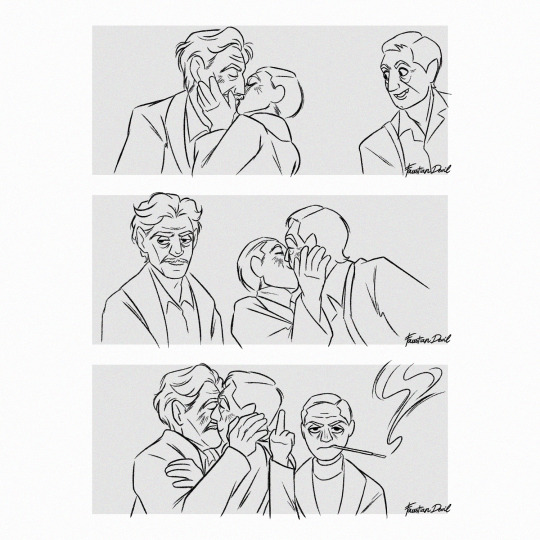
POV: You are Kay Kyser + band and the evil gays are making out right before gunning you down. What you do?
Original meme image under the cut.
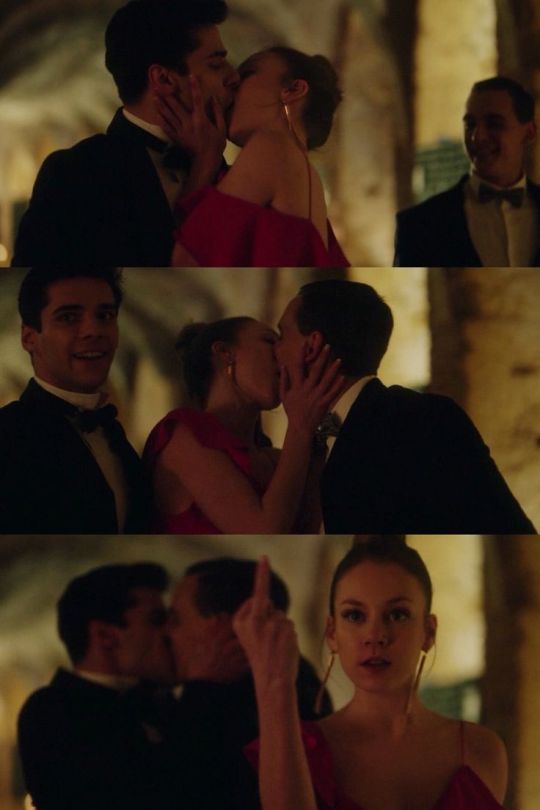
#You'll Find Out#You'll Find Out (1940)#Peter Lorre#Boris Karloff#Bela Lugosi#Lugosi Bela#Béla Lugosi#Lugosi Béla#Professor Karl Fenninger#Karl Fenninger#Judge Spencer Mainwaring#Spencer Mainwaring#Prince Saliano#Faustian Fables#Faustian Imagery#I messaged Soap early in the morning like Damn now I gotta draw my headcanons with them too#I also had another idea but only this for now
42 notes
·
View notes
Text
Alternatively
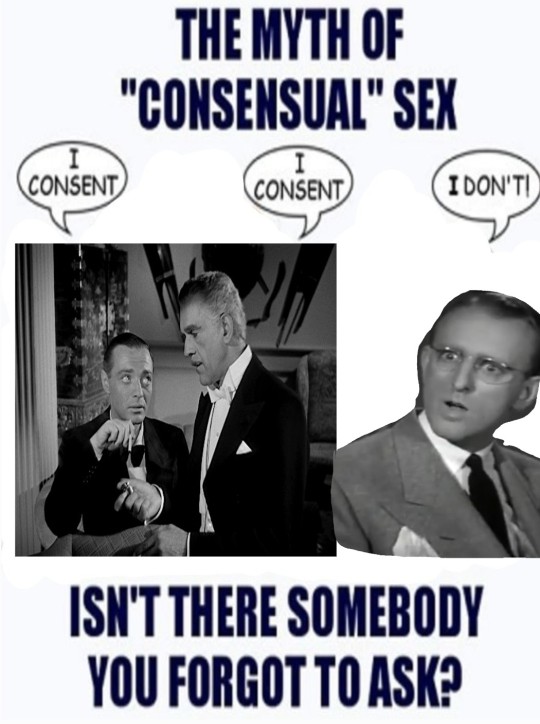
#youll find out#professor karl fenninger#judge spencer mainwaring#kay kyser#mememes#tbh this one doesnt feel very accurate#mostly because of kay kysers general obliviousness in this movie#but his face here makes me laugh so i had to make one with him
7 notes
·
View notes
Photo
beautyandterrordance:
Right now: You’ll Find Out, 1940
beautyandterrordance:
Right now: You’ll Find Out, 1940

#fenningers fucking chocking! someone help him!!#does kay kyser make that face in the film cause i think this is the second poster ive seen where hes doing it#i like that ginny looks kinda like bell from batb but i once saw a colourised version of her dress where it was a faded pink and i loved it#so much i refuse to accept it in any other colour#yknow the more i think of it the more i like ginny#idk shes the only one of kay kysers troupe whos segments i enjoy#youll find out#professor karl fenninger#judge spencer mainwaring#prince saliano#kay kyser#ginny simms#wait wtf where the hell is Mainwarings moustache????#poster
11 notes
·
View notes